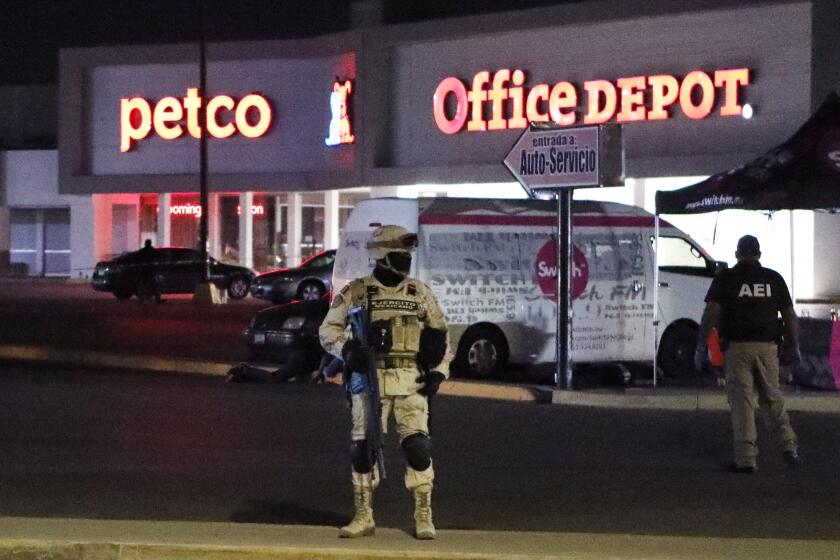Mexican border cities hit by burning vehicles, blockades
- Share via
TIJUANA, Mexico — The Mexican border cities of Tijuana, Mexicali, Rosarito and Ensenada were hit by gang violence that included vehicles being set ablaze and road blockades.
The U.S. Consulate in Tijuana instructed its employees “to shelter in place until further notice” around midnight because of the violence.
It was the third time this week Mexican cities have seen widespread arson and shootings by drug cartels. The gangs appear to be targeting stores, vehicles and innocent bystanders in response to disputes or attempts to capture gang members.
Baja California state officials said a total of 24 vehicles had been hijacked and burned at different points throughout the state: 15 in Tijuana, three in Rosarito and two each in Mexicali, Ensenada and Tecate.
An outbreak of violence in Ciudad Juarez, across the border from El Paso, and in the western states of Jalisco and Guanajuato have stunned even Mexicans accustomed to violence.
Tijuana Mayor Montserrat Caballero blamed it on disputes between drug gangs and asked them to stop the violence.
Caballero issued a public appeal to “organized crime,” the term used in Mexico for drug cartels, to stop the growing trend of targeting innocent civilians.
“Today we are saying to the organized crime groups that are committing these crimes, that Tijuana is going to remain open and take care of its citizens,” Caballero said in a video, “and we also ask them to settle their debts with those who didn’t pay what they owe, not with families and hard-working citizens.”
The extent of the violence was still unclear Saturday. Late Friday, the U.S. Consulate General in Tijuana said in a statement that it “is aware of reports of multiple vehicle fires, roadblocks, and heavy police activity in Tijuana, Mexicali, Rosarito, Ensenada, and Tecate.”
On Saturday, few people ventured out on the streets in Tijuana and many of the bus and passenger van services stopped running, leaving some residents unable to get where they were going.
“Let them fight it out among themselves, but leave us alone,” said Tijuana resident Blanca Estela Fuentes, as she looked for some means of public transport. “So they kill each other, they can do whatever they want, but the public, why are we to blame?”
The federal public safety department said one person was wounded in the violence and that federal, state and local forces had detained 17 suspects, including seven in Tijuana, and four each in Rosarito and Mexicali.
The mayor’s comment about Tijuana remaining open was an apparent reference to the border city of Ciudad Juarez, across from El Paso, Texas, where some classes and public events were canceled after similar violence on Thursday.
Alleged gang members went on a shooting spree in Ciudad Juarez, killing nine people, including four employees of a radio station, after a fight between rival gangs at a local prison left two inmates dead.
On Tuesday, drug cartel gunmen burned vehicles and businesses in the western states of Jalisco and Guanajuato in response to an attempt to arrest a high-ranking leader of the Jalisco cartel.
Oxxo, a national chain of convenience stores owned by Femsa, the country’s largest bottling company, said 25 of its stores in Guanajuato — which borders Jalisco, home to the cartel of the same name — were either totally or partially burned Tuesday.
The area around Tijuana, which borders southern California, is a lucrative drug-trafficking corridor long dominated by the Arellano Felix cartel but that has since become a battle ground among various gangs, including the Jalisco and Sinaloa cartels.
Speaking about the Ciudad Juarez violence Thursday, President Andrés Manuel López Obrador said: “They attacked the civilian, innocent population like a sort of revenge. It wasn’t just a clash between two groups, but it got to the point where they began to shoot civilians, innocent people. That is the most unfortunate thing in this affair.”
Four employees of the MegaRadio station who were broadcasting a live promotional event outside a pizza store in Ciudad Juarez were killed in the shootings.
Such random violence is not without precedent in Mexico.
In June of last year, a rival faction of the Gulf cartel entered the border city of Reynosa and killed 14 people the governor identified as “innocent citizens.” The military responded and killed four suspected gunmen.
And cartels in Mexico frequently hijack vehicles and burn them to distract police or prevent them from pursuing gunmen.
More to Read
Sign up for Essential California
The most important California stories and recommendations in your inbox every morning.
You may occasionally receive promotional content from the Los Angeles Times.









